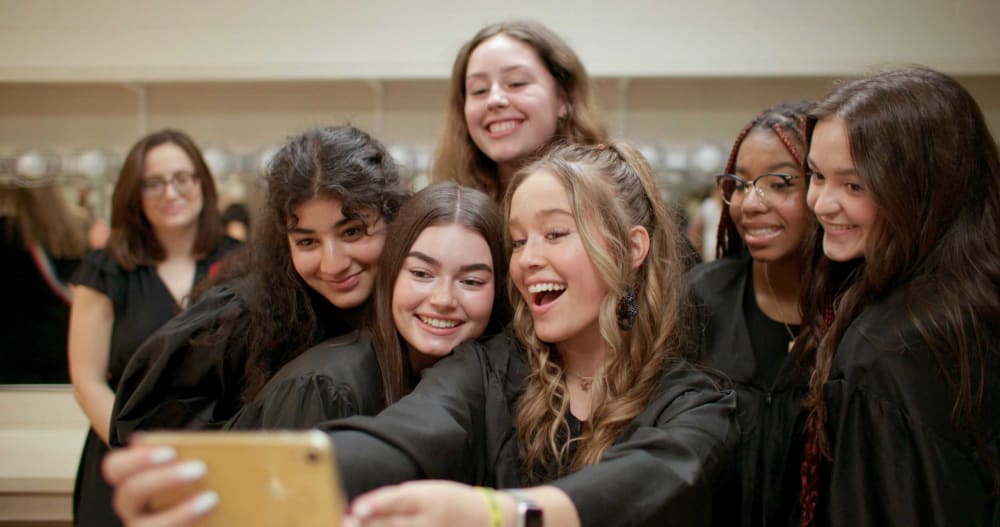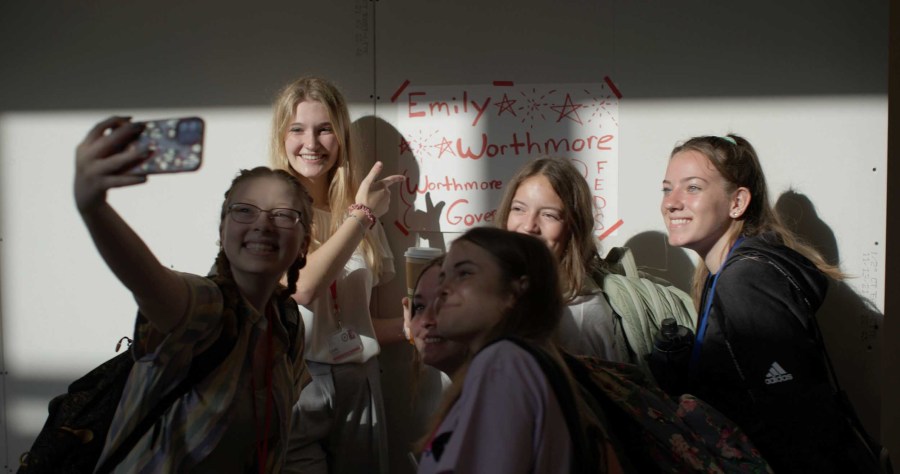In 2020, filmmakers Jesse Moss and Amanda McBaine took a deep dive into the world of Gen Z politics with their critically acclaimed documentary “Boys State,” which followed 1,000 teenage boys who gather at a week-long summer camp in Texas to form a mock government.
Ahead of a critical presidential election, Moss and McBaine are back with a timely followup called “Girls State,” which was released recently on Apple TV+. The new documentary follows 500 Missouri teenage girls, from wildly different backgrounds, as they gather for a week-long immersion program, where they build a government from the ground up, campaign for office and form a Supreme Court to weigh in on the most divisive issues of the day, including abortion, gun violence and climate change.
Moss said adults can learn a lot from giving teenage girls the mic.
“Perhaps we can learn a lot but not only listening more to this generation but watching them model a politics of civility, something our adult politicians seem to have a hard time doing,” he said.
Know Your Value recently chatted with Moss and McBaine about their documentary, what they learned about female leadership, how young voters will shape the upcoming presidential election and more.
Below is the conversation, which has been edited for brevity and clarity:
Tell us why you decided to do a follow up to “Boys State”? And why did you pick Missouri?
Jesse Moss: We always knew we would make “Girls State.” It was never a matter of why, just a matter of when, where and how. “Boys State,” an inspiring and terrifying meditation on electoral politics and what it means to win at all costs, had satisfied our curiosity about how young people were taking in the political behaviors of the “Adult State.” We did not want to make the same film starring girls. We were curious, would girls do government differently?
Missouri Girls State offered a new dynamic. During the week, citizens build a third branch of government, the judicial branch. Citizens would not only be competing for governor, they would also compete to be a justice on the Supreme Court and decide one momentous case at the end of the week.

We were also drawn to the magnitude and vibrancy of the large Missouri Girls State organization and the political and cultural diversity of the state. With “blue” cities and “red” suburbs and rural communities, Missouri is home to both conservative Senator Josh Hawley (author of the recent book, “Manhood: the Masculine Virtues America Needs”) and liberal ‘squad’ member Rep. Cori Bush. In some ways, this mid-western state is emblematic of the country as a whole, of its problems and its strengths.
The film follows the high school girls through a week-long immersive experiment to build a government from the ground up. What do you think the biggest takeaways were about female leadership?
Amanda McBaine: Representation matters in a representational democracy. The new dynamic to the girls program that we did not explore in the boys program was representation. How had girls internalized the inequity of female representation in government?
As one of the counselors says in the opening meeting “We have a lot in common. We have never seen a female president. What do we do? We step up!” In an all-female space, there was no shortage of stepping up. It was noteworthy that hundreds of girls competed for the position of Supreme Court justice whereas fewer competed for governor. We can only think that has to do with what they see modeled in the real world: a court with four female justices.
At the time of the filming, the leaked US Supreme Court document suggested that the constitutional right to an abortion was about to be overruled. How did this affect the dynamic and storyline?
Amanda McBaine: Shortly after the Supreme Court heard oral arguments on the Dobbs v. Jackson Women’s Health Organization case in Dec 2021, we began our casting process, where we met on Zoom with hundreds of high school juniors headed to the Girls State program that summer. They had a lot to say!
In a state like Missouri, where in 2019 the 72 percent male state legislature passed a trigger law banning all abortion unless a medical emergency, the stakes for a potential federal ban were very high. It felt very special to speak with a group of young women who would be most directly affected by this law but who had had the least say about its making, and to whom very few had asked—how do you feel? The conversation was not so much about the moral rights and wrongs of the issue as much as the legal conversation about body autonomy. This was notable to us in such a red state. There was truly an eagerness to talk about it.












